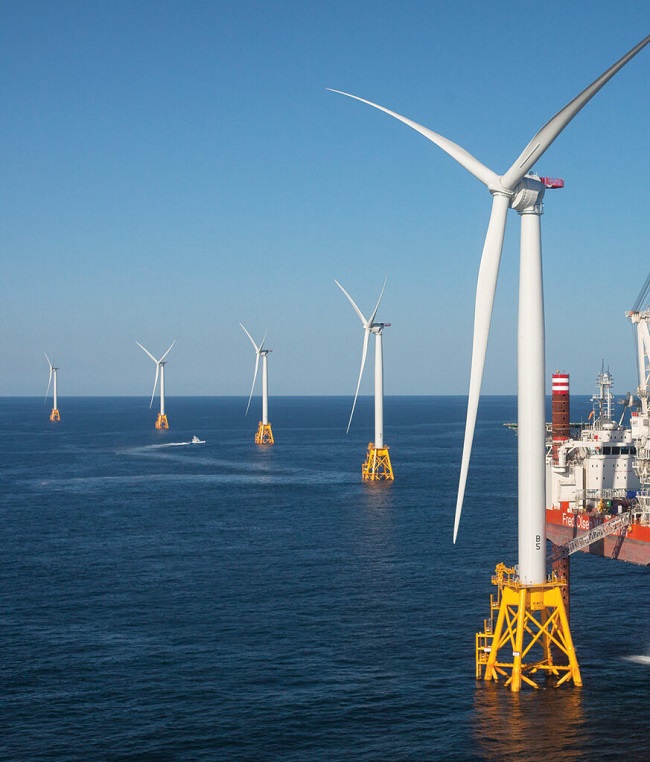
PROVIDENCE – Gov. Daniel J. McKee announced Wednesday that he will be committing more than $150 million that is earmarked for a series of climate change initiatives in his proposed fiscal year 2023 budget.
McKee said the proposals, designed to reduce greenhouse gases and create jobs, would be funded from the $1.1 billion the state received from the American Rescue Plan Act.
The proposal, which includes creation of an environmental justice committee, would have no impact on state general revenues.
“Rhode Island is a national leader in clean energy innovation, and we must harness the historic opportunity before us by capitalizing on our state’s solid foundation in these sectors,” McKee said. “Our multi-agency team is committed to investments to improve the quality of our air and water, protect green space, ensure equitable shoreline access and expand access to affordable and sustainable clean energy solutions. Slashing greenhouse gasses is not just the right thing to do for the environment – it is also the right thing to do for our economy.”
Expenditures would include investments in a hub for offshore wind development, support transformation of the heating sector, electrify transportation, build municipal resiliency, conserve forests and strengthen the state’s Executive Climate Change Coordinating Council, or EC4. The council is responsible for assessing, integrating and coordinating climate change efforts throughout state government to reduce greenhouse gas emissions and prepare Rhode Islanders for the effects of climate change.
McKee said he is directing the Executive Climate Change Coordinating Council to create an environmental justice committee solely focused on issues that impact the most vulnerable residents in the state.
McKee’s proposed investments include:
- $60 million to improve infrastructure at the Port of Davisville in North Kingstown for offshore wind development, construction of the Terminal 5 Pier and completion of required dredging, preparation of about 34 acres to accommodate additional cargo laydown, and reconstruction and hardening of the existing surface of Pier 1.
- $37 million toward the creation of an Electric Heat Pump Incentive Program run by the R.I. Office of Energy Resources. These funds will help homeowners and small to midsized business owners purchase and install high-efficiency electric heat pumps, with an emphasis on families in environmental justice communities.
- $35 million for the city of East Providence’s proposed improvements to the South Quay Marine Terminal to create an integrated, centralized hub of intermodal shipping designed to support the offshore wind industry.
- $23 million in federal and state funding to expand Rhode Island’s network of electric vehicle charging stations through a joint incentive program managed by OER and the R.I. Department of Transportation in consultation with the R.I. Department of Environmental Management. Total federal funding for this program is expected to be $22.9 million through fiscal 2026.
- $6 million on an annual basis to the Executive Climate Change Coordinating Council to support advancement of Act on Climate mandates, including investments in energy efficiency, renewable energy, clean transportation, clean heating, energy storage, demand-side management and other greenhouse gas reduction strategies.
McKee has also included a separate budget article proposing a Green Bond for inclusion on the ballot in November. The Green Bond includes, among other things, the following investments in programs:
- $16 million for the Municipal Resilience Program administered and financed by the Rhode Island Infrastructure Bank. This matching grant funding stream helps local communities restore and improve resilience of vulnerable coastal habitats, river and stream floodplains, and infrastructure.
- $5 million for RIIB’s small-business energy loan program, which removes barriers to clean energy project implementation and provides zero-interest and below-market loans for clean energy projects.
- $3 million for forest conservation programs run by DEM.
Terry Gray, R.I. Department of Environmental Management acting director and chair of the Executive Climate Change Coordinating Council, said, “The governor’s bold budget commitments, including direct funding to the EC4 for the first time, make good on his promise to take action against climate change and deliver the urgent remedies that the new law demands.”
Nicholas S. Ucci, the state’s energy commissioner, said the clean energy budget initiatives further advance Rhode Island’s commitment to a sustainable future, including a focus on equity.
“With these commitments, including plans to deploy more high-efficiency heat pumps and EV charging stations, Ocean State families and businesses will have increased access to clean and affordable energy alternatives,” he said.
Cassius Shuman is a PBN staff writer. Contact him at Shuman@PBN.com. You may also follow him on Twitter @CassiusShuman.










